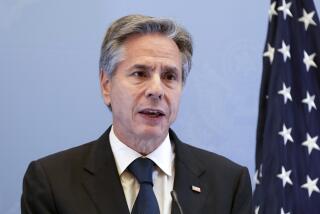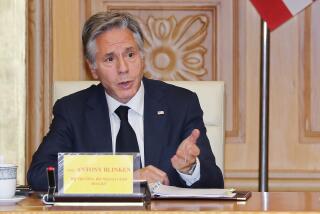Interim nuclear deal greeted positively by most Iranians
TEHRAN — Word that the interim nuclear deal between Iran and world powers will go into effect this month for the most part was met positively in the Iranian capital, though some hard-liners reiterated their opposition.
“Maybe our business will be better in six months or so,” said Amir Mosavi, 30, a downtown vendor of wrist watches and clocks, who, like many others, views the accord as a possible prelude to improvement for the nation’s sluggish, sanctions-battered economy.
In the money exchange market near the British Embassy, the Iranian rial rose slightly against the U.S. dollar, a sign of confidence for a currency pummeled in the past year by Western-led sanctions.
On Sunday, U.S. and Iranian officials announced that the first phase of the interim nuclear deal between Iran and six world powers would take effect on Jan. 20. Under the agreement worked out in Geneva on Nov. 24, Iran will then begin to get access to some of the more than $4 billion in frozen overseas funds, while agreeing to constraints on its nuclear program and enhanced international inspections.
The Jan. 20 date marks a six-month period during which Iran and world powers are slated to negotiate a longer-term deal on the Iranian nuclear program. Tehran says its nuclear efforts are strictly for peaceful purposes, despite suspicions in Washington and elsewhere that it may be seeking to construct a nuclear weapon.
On Monday, Iranian newspapers touted the news that the interim deal would come into effect later this month. The face of Iran’s chief nuclear envoy, Deputy Foreign Minister Abbas Araqchi, stared from many moderate and reformist newspapers.
The Iranian religious and political establishment has endorsed the deal, a centerpiece of the administration of President Hassan Rouhani, who has sought relief from international economic sanctions.
However, hard-liners and conservatives remain suspect about the motivations of the United States and other nations demanding limits on Iran’s nuclear efforts. Opponents argue that Tehran has conceded too much in limiting its nuclear program and received too little in return.
“All of the points of the agreement are against Iran’s interest,” wrote Husian Shariatmadari, chief editor of Kayhan, a hard-line opposition daily.
A student opposed to the deal, who asked to be identified only as Ali for privacy reasons, said: “Iran has given up the fruits of 10 years of scientific achievement in exchange for ambiguous returns.”
[Updated 2:18 p.m. Jan. 13: In Washington, President Obama again urged Congress to not impose fresh sanctions on Iran while negotiations continue. Iran has threatened to break off talks if U.S. lawmakers carry through with their threatened legislation.
Obama said the interim agreement gave the parties “the time and space” to reach a comprehensive accord.
Iranians will benefit if they are “willing to walk through the door of opportunity that’s presented,” he said. “If they fail to walk through this door of opportunity, then we are in position to reverse the interim agreement and put in place additional pressure to make sure that Iran does not develop a nuclear weapon.”]
Mostaghim is a special correspondent. Times staff writers Patrick J. McDonnell in Beirut and Christi Parsons in Washington contributed to this report.
More to Read
Start your day right
Sign up for Essential California for news, features and recommendations from the L.A. Times and beyond in your inbox six days a week.
You may occasionally receive promotional content from the Los Angeles Times.






